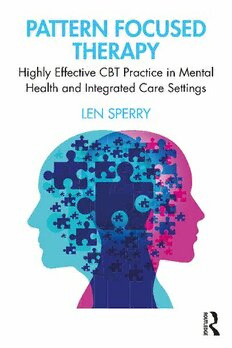
Pattern Focused Therapy: Highly Effective CBT Practice in Mental Health and Integrated Care Settings PDF
Preview Pattern Focused Therapy: Highly Effective CBT Practice in Mental Health and Integrated Care Settings
“ ff In Pattern Focused Therapy, Dr. Sperry o ers another remarkably timely, practical, easy-to-read contribution for both students and professionals in health and mental health care professions. In our current healthcare marketplace clinicians must ffi provide brief, evidence-based, practical, and e cacious treatments for their clients and this new book will help them to do so. It represents the new third wave of fi cognitive behavioral therapy that addresses six compelling trends in the eld just perfectly. Clearly, this book should be in the hands of all practitioners today and is ” likely to become a classic. – Thomas G. Plante, Ph.D., Santa Clara University and Stanford University School of Medicine “ Pattern Focused Therapy is one of the most practical texts available on how to do brief CBT evidence-based practice therapy. This book provides all the necessary tools for assessment, case conceptualization, technique selection, and outcomes monitoring in clear step-by-step procedures and therapy session examples. fi Beginners and experts alike will bene t from a special chapter dealing with practical strategies for preventing premature termination. If you want to learn ff – ” how to do e ective therapy in 4 6 sessions, this book will show you how. – Brian A. Gerrard, Ph.D., Western Institute for Social Research, Berkeley, and University of San Francisco “ ’ Dr. Sperrys book is a valuable addition to third wave cognitive-behavioral therapy. ’ Pattern Focused Therapy is a clear and accessible presentation of Sperrys brief, rela- tionally focused, and evidence-based approach to progressive cognitive-behavioral therapy. It is an essential resource for therapists-in-training, therapy educators, and ” seasoned clinicians. – Richard E. Watts, Ph.D., distinguished professor, Sam Houston State University Pattern Focused Therapy Pattern Focused Therapy incorporates brief cognitive behavioral therapy (CBT) interventions for symptom reduction and a step-by-step therapeutic strategy for ff ’ e ectively changing clients maladaptive patterns and increasing their well-being. Integrating research, clinical expertise, and client needs and values, Pattern ff Focused Therapy is a highly e ective third-wave CBT approach that can be applied to a wide range of clients. This text guides therapists through the pattern focused approach, facilitating learning through session-by-session transcriptions fi fi and commentaries from the rst to the nal session. Interventions for optimizing treatment and indicators of successful therapy are included along with a chapter on Pattern Focused Therapy in integrated care settings. fi Seasoned and beginner therapists alike will bene t from this invaluable method for learning and mastering this evidence-based approach. Len Sperry, M.D., Ph.D., is a Professor at Florida Atlantic University. He has practiced, taught, and written about CBT for four decades. Among his 1000+ professional publications are six other CBT books. Pattern Focused Therapy ff Highly E ective CBT Practice in Mental Health and Integrated Care Settings Len Sperry Firstpublished2021 byRoutledge 52VanderbiltAvenue,NewYork,NY10017 andbyRoutledge 2ParkSquare,MiltonPark,Abingdon,OxonOX144RN RoutledgeisanimprintoftheTaylor&FrancisGroup,aninformabusiness ©2021Taylor&Francis TherightofLenSperrytobeidentifiedasauthorofthisworkhasbeen assertedbyhiminaccordancewithsections77and78oftheCopyright, DesignsandPatentsAct1988. Allrightsreserved.Nopartofthisbookmaybereprintedorreproduced orutilisedinanyformorbyanyelectronic,mechanical,orothermeans, nowknownorhereafterinvented,includingphotocopyingandrecording, orinanyinformationstorageorretrievalsystem,withoutpermissionin writingfromthepublishers. Trademarknotice:Productorcorporatenamesmaybetrademarksor registeredtrademarks,andareusedonlyforidentificationandexplanation withoutintenttoinfringe. LibraryofCongressCataloging-in-PublicationData Names:Sperry,Len,author. Title:Pattern-focusedtherapy:highlyeffectiveCBTpracticeinmental healthandintegratedcaresettings/LenSperry. Description:NewYork:Routledge,[2020]|Includesbibliographical referencesandindex.|Identifiers:LCCN2020007191(print)| LCCN2020007192(ebook)| ISBN9780367429300(hardback)|ISBN9780367429317(paperback)| ISBN9780367429331(ebook) Subjects:LCSH:Cognitivetherapy. Classification:LCCRC489.C6S642020(print)|LCCRC489.C6(ebook)| DDC616.89/1425–dc23 LCrecordavailableathttps://lccn.loc.gov/2020007191 LCebookrecordavailableathttps://lccn.loc.gov/2020007192 ISBN:978-0-367-42930-0(hbk) ISBN:978-0-367-42931-7(pbk) ISBN:978-0-367-42933-1(ebk) TypesetinPerpetua byTaylor&FrancisBooks Contents Acknowledgments viii Introduction ix 1 Pattern Focused Therapy and Psychotherapy Practice: Today and Tomorrow 1 2 Pattern: Assessment and Case Conceptualization 16 3 Practicing Pattern Focused Therapy 44 4 Ultra-Brief Therapeutic Interventions 63 5 Outcomes Assessment and Indicators of Successful Treatment 80 6 The First Session 98 7 The Middle Sessions 120 8 The Final Sessions 141 9 Interventions for Optimizing Treatment 156 10 Pattern Focused Therapy in Integrated Care Settings 184 Index 204 Acknowledgements fi I am deeply grateful to those who have mentored me over the years in the ne points of psychotherapy practice. Of particular note are Rudolf Dreikurs, M.D., Kenneth I. Howard, Ph.D., Richard Cox, Ph.D., and Barry Blackwell, M.D. ff Special thanks to the editorial sta of Routledge, particularly my editor Nina Guttapalle, for their valuable input. Finally, I want to acknowledge two of my former doctoral students. Vassilia Binenstzok, Ph.D. who collaborated with me on some related projects, and Gerardo Casteleiro, Ph.D. for editorial assistance with this project. Introduction Thereislittledoubtthatpsychotherapypracticetodayischangingandchangingrather ff dramatically. Itismuchdi erentthanitwas10yearsago,anditisexpectedtochange evenmoreinthenearfuture.Severalfactorsaccountforthischange,butthreestandout. fi The rst is reimbursement. Reimbursement of psychotherapy and related mental health services increasingly requires that therapists document the use of evidence-based approaches and interventions. Currently, all clinical psychology graduate programs require their students to master at least one evidence-based treatment approach. Unfortunately, very few other graduate therapy training programs emphasize evidence-based approaches or require the teaching and learning of evidence-based practice and interventions. Thesecondisthattreatmentisgettingshorter. Notonlyisthedurationorlength of therapy getting shorter, but therapy sessions are getting shorter. Instead of the usual 12-20sessionsasthe norm, thetypical courseoftreatmentwill more likely to be 4-8 therapeutic encounters. Instead of 50 minutes sessions, the length of the therapeuticencounterwilllastaslittleas15-30minutes. Thethirdisthatisthatwhereittakesplace,thetreatmentcontext,isbeginningto change. It is predicted that much of psychotherapy practice will shift from dedicated mentalhealthsettingstointegratedprimarycaremedicalsettings. Here,thetherapist will function as part of a health care team which includes physician, nurse, medical fi assistant, and a therapist in the role of behavioral health consultant. While at rst this mayseemalientomanytherapists,itmayactuallybeawelcomechange. For starters, ’ integratedprimarycareismorecompatiblewithpsychotherapysfocusonstrengthsand prevention in addition to pathology. For another, there is little or no need to seek authorizationfortreatmentorprovideextensivedocumentationforcounselingservices in a medical setting. Finally,workingas a salaried member of a team beats competing withothermentalhealthprofessionalsforHMOpanelsandinsurancereimbursement. fi Thesethreeanticipatedchangesareveryrealandwillrequiresigni cantchangesin how therapists are trained and practice. There is little doubt that therapists will be expected and required to practice newor greatly revised treatment approaches that
